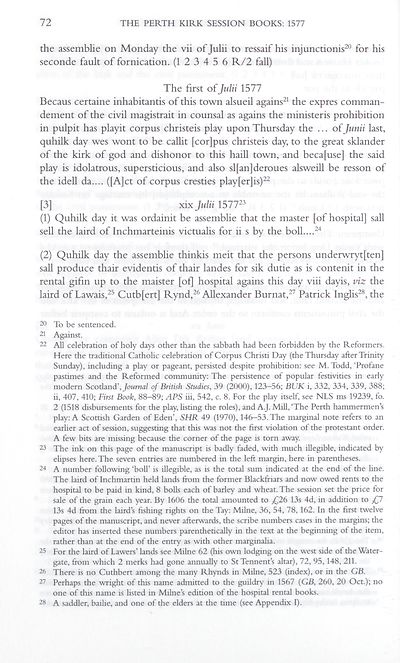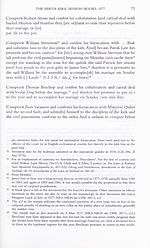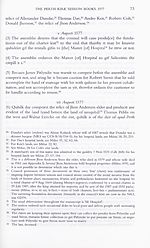Series 6 > Perth Kirk Session books, 1577-1590
(87) Page 72
Download files
Complete book:
Individual page:
Thumbnail gallery: Grid view | List view

72
THE PERTH KIRK SESSION BOOKS: 1577
the assemblie on Monday the vii ofjulii to ressaif his injunctionis20 for his
seconde fault of fornication. (1 2 3 4 5 6 R/2 fall)
The first of Julii 1577
Becaus certaine inhabitantis of this town alsueil agains21 the expres comman-
dement of the civil magistrait in counsal as agains the ministeris prohibition
in pulpit has playit corpus christeis play upon Thursday the ... of Junii last,
quhilk day wes wont to be callit [cor] pus christeis day, to the great sklander
of the kirk of god and dishonor to this haill town, and beca[use] the said
play is idolatrous, supersticious, and also sl[an]deroues alsweill be resson of
the idell da.... ([A]ct of corpus cresties play[er]is)22
[3] xix Julii 157723
(1) Quhilk day it was ordainit be assemblie that the master [of hospital] sail
sell the laird of Inchmarteinis victualis for ii s by the boll....24
(2) Quhilk day the assemblie thinkis meit that the persons underwrytften]
sail produce thair evidentis of thair landes for sik dutie as is contenit in the
rental gifin up to the maister [of] hospital agains this day viii dayis, viz the
laird of Lawais,25 Cutb[ert] Rynd,26 Allexander Burnat,27 Patrick Inglis28, the
20 To be sentenced.
21 Against.
22 AH celebration of holy days other than the sabbath had been forbidden by the Reformers.
Here the traditional Catholic celebration of Corpus Christi Day (the Thursday after Trinity
Sunday), including a play or pageant, persisted despite prohibition: see M. Todd, ‘Profane
pastimes and the Reformed community: The persistence of popular festivities in early
modern Scodand’, Journal of British Studies, 39 (2000), 123-56; BUK i, 332, 334, 339, 388;
ii, 407, 410; First Book, 88-89; APS iii, 542, c. 8. For the play itself, see NTS ms 19239, fo.
2 (1518 disbursements for the play, listing the roles), and AJ. Mill,‘The Perth hammermen’s
play: A Scottish Garden of Eden’, SHR 49 (1970), 146-53. The marginal note refers to an
earher act of session, suggesting that this was not the first violation of the protestant order.
A few bits are missing because the corner of the page is torn away.
23 The ink on this page of the manuscript is badly faded, with much illegible, indicated by
elipses here. The seven entries are numbered in the left margin, here in parentheses.
24 A number following ‘boll’ is illegible, as is the total sum indicated at the end of the line.
The laird of Inchmartin held lands from the former Blackfriars and now owed rents to the
hospital to be paid in kind, 8 bolls each of barley and wheat. The session set the price for
sale of the grain each year. By 1606 the total amounted to £26 13s 4d, in addition to £7
13s 4d from the laird’s fishing rights on the Tay: Milne, 36, 54, 78,162. In the first twelve
pages of the manuscript, and never afterwards, the scribe numbers cases in the margins; the
editor has inserted these numbers parenthetically in the text at the beginning of the item,
rather than at the end of the entry as with other marginaha.
25 For the laird of Lawers’ lands see Milne 62 (his own lodging on the west side of the Water¬
gate, from which 2 merks had gone annually to St Tennent’s altar), 72, 95,148, 211.
26 There is no Cuthbert among the many Rhynds in Milne, 523 (index), or in the GB.
27 Perhaps the wright of this name admitted to the guildry in 1567 (GB, 260, 20 Oct.); no
one of this name is listed in Milne’s edition of the hospital rental books.
28 A saddler, bailie, and one of the elders at the time (see Appendix I).
THE PERTH KIRK SESSION BOOKS: 1577
the assemblie on Monday the vii ofjulii to ressaif his injunctionis20 for his
seconde fault of fornication. (1 2 3 4 5 6 R/2 fall)
The first of Julii 1577
Becaus certaine inhabitantis of this town alsueil agains21 the expres comman-
dement of the civil magistrait in counsal as agains the ministeris prohibition
in pulpit has playit corpus christeis play upon Thursday the ... of Junii last,
quhilk day wes wont to be callit [cor] pus christeis day, to the great sklander
of the kirk of god and dishonor to this haill town, and beca[use] the said
play is idolatrous, supersticious, and also sl[an]deroues alsweill be resson of
the idell da.... ([A]ct of corpus cresties play[er]is)22
[3] xix Julii 157723
(1) Quhilk day it was ordainit be assemblie that the master [of hospital] sail
sell the laird of Inchmarteinis victualis for ii s by the boll....24
(2) Quhilk day the assemblie thinkis meit that the persons underwrytften]
sail produce thair evidentis of thair landes for sik dutie as is contenit in the
rental gifin up to the maister [of] hospital agains this day viii dayis, viz the
laird of Lawais,25 Cutb[ert] Rynd,26 Allexander Burnat,27 Patrick Inglis28, the
20 To be sentenced.
21 Against.
22 AH celebration of holy days other than the sabbath had been forbidden by the Reformers.
Here the traditional Catholic celebration of Corpus Christi Day (the Thursday after Trinity
Sunday), including a play or pageant, persisted despite prohibition: see M. Todd, ‘Profane
pastimes and the Reformed community: The persistence of popular festivities in early
modern Scodand’, Journal of British Studies, 39 (2000), 123-56; BUK i, 332, 334, 339, 388;
ii, 407, 410; First Book, 88-89; APS iii, 542, c. 8. For the play itself, see NTS ms 19239, fo.
2 (1518 disbursements for the play, listing the roles), and AJ. Mill,‘The Perth hammermen’s
play: A Scottish Garden of Eden’, SHR 49 (1970), 146-53. The marginal note refers to an
earher act of session, suggesting that this was not the first violation of the protestant order.
A few bits are missing because the corner of the page is torn away.
23 The ink on this page of the manuscript is badly faded, with much illegible, indicated by
elipses here. The seven entries are numbered in the left margin, here in parentheses.
24 A number following ‘boll’ is illegible, as is the total sum indicated at the end of the line.
The laird of Inchmartin held lands from the former Blackfriars and now owed rents to the
hospital to be paid in kind, 8 bolls each of barley and wheat. The session set the price for
sale of the grain each year. By 1606 the total amounted to £26 13s 4d, in addition to £7
13s 4d from the laird’s fishing rights on the Tay: Milne, 36, 54, 78,162. In the first twelve
pages of the manuscript, and never afterwards, the scribe numbers cases in the margins; the
editor has inserted these numbers parenthetically in the text at the beginning of the item,
rather than at the end of the entry as with other marginaha.
25 For the laird of Lawers’ lands see Milne 62 (his own lodging on the west side of the Water¬
gate, from which 2 merks had gone annually to St Tennent’s altar), 72, 95,148, 211.
26 There is no Cuthbert among the many Rhynds in Milne, 523 (index), or in the GB.
27 Perhaps the wright of this name admitted to the guildry in 1567 (GB, 260, 20 Oct.); no
one of this name is listed in Milne’s edition of the hospital rental books.
28 A saddler, bailie, and one of the elders at the time (see Appendix I).
Set display mode to:
![]() Universal Viewer |
Universal Viewer | ![]() Mirador |
Large image | Transcription
Mirador |
Large image | Transcription
Images and transcriptions on this page, including medium image downloads, may be used under the Creative Commons Attribution 4.0 International Licence unless otherwise stated. ![]()
| Scottish History Society volumes > Series 6 > Perth Kirk Session books, 1577-1590 > (87) Page 72 |
|---|
| Permanent URL | https://digital.nls.uk/127281681 |
|---|
| Description | Over 180 volumes, published by the Scottish History Society, containing original sources on Scotland's history and people. With a wide range of subjects, the books collectively cover all periods from the 12th to 20th centuries, and reflect changing trends in Scottish history. Sources are accompanied by scholarly interpretation, references and bibliographies. Volumes are usually published annually, and more digitised volumes will be added as they become available. |
|---|


